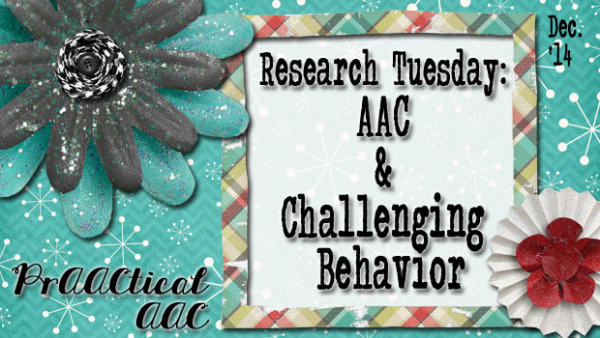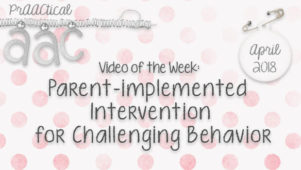Research Tuesday: AAC and Challenging Behavior

Research reviews are helpful tools for SLPs looking to implement evidence-based practices in their clinical work. In this month’s Research Tuesday post, we look at the work of Drs. Virginia Walker and Martha Snell, who conducted a meta-analysis to look at the relationship between challenging behaviors and AAC interventions. They looked at 54 different research studies with a total of 111 children and adults with AAC needs. They conducted both analytical and descriptive analyses.
The research studies included participants at the emerging, prelinguistic, and multi-word levels of communication. Challenging behaviors were codes as distracting, disruptive, and/or destructive. Effect sizes were calculated using the Non-overlap of All Pairs method.
Among their findings:
- AAC interventions reduce challenging behavior across a wide range of participants, including children and adults with a variety of developmental disabilities.
- AAC interventions were more effective with children (12 and under) than they were with adults (18 years and older) who had AAC needs.
- Interventions that used Functional Communication Training (FCT) were more effective than interventions that used the Picture Exchange Communication System (PECS).
- Interventions that included Functional Behavior Assessments (FBA) were more successful that interventions that did not use FBA as part of their assessment process.
- Many times, the interventions occur outside of natural environments (e.g., university clinics) and were implemented by unfamiliar communication partners (e.g., researchers).
No significant differences in effect size were found for:
- Participant characteristics, including diagnosis, gender, pre-intervention communication modalities, or type of behavior prior to intervention.
- Intervention characteristics, such as the setting, method, person delivering intervention, and type of FBA
- Intervention outcomes characteristics, specifically the communication modes used, participants’ levels of expressive communication levels, or what specific challenging behavior was targeted.
The authors note that many of the studies did not follow best practices in single subject research. They suggest that future research be conducted in natural settings with typical interventionists, and employ quality indicators of single case research in the areas of skill maintenance, generalization, and fidelity of treatment procedures. Overall, this study supports using AAC interventions for reducing challenging behaviors across a variety of clinical populations during childhood. Intervening during childhood, basing intervention decisions on the results FBAs, and using FCT to address challenging behavior are also supported by their findings.
Filed under: PrAACtical Thinking
Tagged With: Challenging Behavior, FBA, FCT, Martha Snell, Research Tuesday, Virginia Walker
This post was written by Carole Zangari




